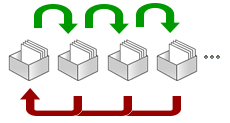I’m reposting here my response to the article about why the Owner of the blog Polyglot Posturings isn’t attracted to using the Goldlist system. Please first read her objections here:
http://kaetslanguages.wordpress.com/2012/02/16/initial-thoughts-on-a-long-term-vocab-learning-system/
OK, first off, I don’t think that flash cards focus on the short term memory. It all depends on how they are used. If you cram them, then you’ll switch on the short term memory. If you take them at a measured pace and make a sort of SRS for yourself from them, you’ll be OK. I have one major problem with flashcards, namely where am I going to keep 16,000 cards? And why bother to waste card for each word when some words will be learned the very first time we see them?
Having cleared up that I am not anti flash card (and I use readthekanji.com as well as goldlisting Japanese, and that’s a flash card approach, only on line) let me take your objections in order.
1. It was twenty minutes, but it doesn’t have to be twenty uninterrupted minutes. It is not necessary to do 25 words at once. I am saying don’t do too much in one go because the long-term memory is an unconscious function so you can’t tell when it’s got tired. You have to anticipate that instead, by having breaks. If you were to do 5 or 10 minutes a go that would also be fine. Only not to be stressed about it.
2. Once you get the system going then you develop a batching system and when you get to the end of the new batch of the headlist, then you simply automatically go back to the beginning again. You remember about it because the book is with you. It’s not necessarily a big book. Oonce you get into it it is relaxing and even addictive, and you don’t have to be in front of a screen or playing with scissors, cards and envelopes. The tools are very simple.
3. I found this argument the most surprising, and I would politely take issue with what fluency means and if it’s really the most important thing. If speaking is the most important skill, moreso than listening, reading or even writing, then I understand why people focus on keeping their smaller vocabularies actuve. It gives them the impression that they have really gone somewhere in a language, even if all they have is 1000 or 2000 words on the tip of their tongue. You cannot watch a film and understand it properly with that, you cannot really read a newspaper, you cannot delve into the literature of the culture you are looking at. You can get by like a glorified tourist, and that’s that. If all the vocab you need in a language is the vocab you’ll use all the time, then you’ll be on a par with the thickoes of that language, able to talk nineteen to the dozen but not being able to formulate very precise thoughts and limiting themselves always to a small pool of words. Your written work will not be interesting to read, anything beyond ordering food or buying shopping will be tough as you will struggle with nuances on only the words you have when you stop being a beginner. If you want to have a decent vocabulary, then it’s a question of building it up to 10,000 or maybe 15,000 words or more. Certainly that is the level that professionals using English in their work as a non-native language are attaining to and if you want to speak their language to them rather than have them simply override your attempts and slip into English with you, that’s what you’ll have to achieve. And that task takes time. Much much longer than the time spent learning just the basic grammar and the main irregular points of grammar,
Let me give you an example from real life of how I once countered the argument against the amassing of vocabulary: I was in a car with someone who said his university lecturer in English said to concentrate on grammar and not vocabulary as if you didn’t know the odd word you’d be able to guess from context what the meaning is. So I said “I see your teacher is an imbecile”, to which he said “is that good or bad?” I rested my case.
Nobody is saying that you have to achieve 15,000 words if you don’t want to. I would say it is very well worthwhile to achieve that “degree level” knowledge and it does mean a completely different kind of fluency than that pseudofluency of always having the 2000 words on the tip of one’s tongue, which actually isn’t possible for more than a few languages at once at 1000-2000 vocab levels anyway. The the passive acquisition of larger vocabularies is a better way to spend time than to spend it continually activating and reactivating a small and stagnant vocabulary.
There is nothing wrong with knowing words for the sake of knowing them. Words are the tools of thought and of ideas, and you never know where they will take you. Words are deeply exciting. So are phrases, for that matter. Knowing words for the sake of knowing them is infinitely preferable to not knowing words for the sake of not knowing them.
Learning 15,000 words in an ineffective way can take so long a person may well never do it. Using Goldlist it should take 600 hours in total, but in small bursts. You can see at every moment and calculate exactly how far along the road you are, and this aids motivation. You know when you pass the half way mark and every other numeric milestone.
52.20190420.976027
Tell all your friends and share the love!
Like this:
Like Loading...

